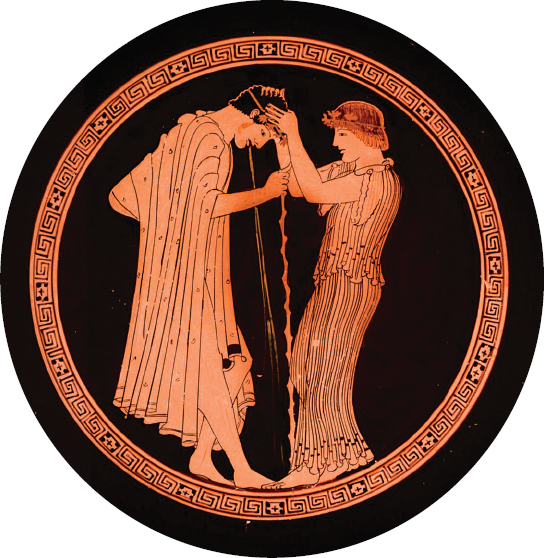Gender and Sexuality
The social conditions of Athenian women have been the subject of much debate, in part because the sources are fragmentary. The available sources suggest that women rarely played notable roles in public affairs. However, we do know that the status of a free woman was strictly protected by law and that only the sons of a citizen woman could be citizens. Only she was in charge of the household and the family’s possessions, yet the law gave her these rights primarily to protect her husband’s interests. Women in Athens and elsewhere in Greece, like those in Mesopotamia, brought dowries to their husbands upon marriage, which went back to their fathers in cases of divorce.
In ancient Athens the main function of women from citizen families was to bear and raise children. Childbirth could be dangerous for both mother and infant, so pregnant women usually made sacrifices or visited temples to ask help from the gods. Women relied on their relatives, on friends, and on midwives to assist in the delivery.
The ideal for Athenian citizen women was apparently a secluded life in which the only men they saw were relatives and tradesmen. The extent to which this ideal was actually a reality is impossible to know, but women in wealthier citizen families probably spent most of their time at home in the gynaeceum, leaving the house only to attend some religious festivals, and perhaps occasionally plays. (See “Individuals in Society: Aspasia.”)

In the gynaeceum, women oversaw domestic slaves and hired labor and, with servants and friends, worked wool into cloth. Women personally cared for slaves who became ill and nursed them back to health and cared for the family’s material possessions as well. Women from noncitizen families lived freer lives than citizen women, although they worked harder and had fewer material comforts. They performed manual labor in the fields or sold goods or services in the agora, going about their affairs much as men did.
Among the services that some women and men sold was sex. Women who sold sexual services ranged from poor streetwalkers known as pornai to middle-
Same-
Along with praise of intellectualized love, Greek authors also celebrated physical sex and desire. The soldier-
The Hellenic and even more the Hellenistic Greeks regarded Sappho as a great lyric poet, although because some of her poetry is directed toward women, over the last century she has become better known for her sexuality than her writing. Today the English word lesbian is derived from Sappho’s home island of Lesbos.
Same-